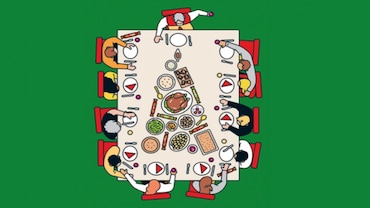- HOME
- /
- Features
- /
- Personalities
- /
The Simple Life: In Conversation with Author, Philanthropist Sudha Murthy
A life of humility, diligence and unerring compassion is the only way of living known to Sudha Murthy
 HarperCollins
HarperCollins
A prolific writer, engineer, professor and philanthropist, Sudha Murthy is a force of nature. Smashing glass ceilings at a time when there were very few women leading the way—she was the first female engineer to be hired by TELCO, India’s largest auto manufacturer—her story is an exemplary account of a formidable trailblazer, who braved the road less travelled.
Reader’s Digest spoke to the award-winning author and social worker about her writing, life and its lessons.
You’ve got a pretty diverse repertoire. You’ve written short stories, travelogues, non-fiction, even books on computer science. How did you decide to start writing for children?
I started writing children’s books because I felt that there is a dearth of stories for kids in India. In the olden days, when children wanted to read English language books, they had to resort to Cinderella, Snow White, Rapunzel—all western classics with princes and princesses—or Enid Blyton. With more and more Indian parents opting to put their children in English-medium schools, I thought children require stories based on the Indian way of life. We cannot truly relate to Enid Blyton in India, because we don’t grow up the way her characters do. Big, joint families, festivals and other staples of Indian life are missing from those stories. So I thought I must write Indian stories for children in English.
You started your writing career in Kannada …
I studied in a Kannada-medium school till the 10th standard, and learnt everything including physics, chemistry in it. I started writing in English only at age 50 and because T. J. S. George, who was a senior editor at the Indian Express, encouraged me to do so.
Did you find the transition from Kannada to English a challenge?
Of course. I remember telling my mother, “It is so difficult. I don’t understand what they say.” I couldn’t read one paragraph of English when I started college. My mother told me, “Start reading English newspapers and books, like you read Kannada ones.” With time and practice, it became easier. Even today when I write Kannada, I write with pen and paper, but use the computer when I write in English.
So much of your writing, your non-fiction work in particular, is about the people you meet when you travel. How do you get all these people to open up about their lives?
Most people are talkative, and like to share their experiences. Several friends and acquaintances have asked me, “Mrs Murthy, how come all these peculiar things happen only to you and not to anyone else?” But I don’t think that’s true. Everybody has interesting encounters but not everyone can express them well. A few of my stories stem from my friends’ experiences as well. They come and tell me their stories saying, “We don’t how to write, but we want our experiences shared.” My canvas is large too. I have had the opportunity to travel a lot and meet people from all walks of life, so maybe I do end up having many more diverse experiences as compared to others.
Finding Love is your second book in the Gopi series. Gopi is, of course, the name of your dog, too. Was it difficult to adopt a non-human perspective?
I grew up with animals. We had a parrot, rabbits, cats and we always had dogs. But Mr Murthy was terrified of dogs. As an eight-year-old, he was bitten by one and had to suffer 18 injections. So, he said “no dogs”. But one day Rohan, my son, brought Gopi home and he stayed with me. So, it was not unusual for me [to write about animals]. Sandhya Prabhat, who illustrated the book did a fantastic job. I shared photos of Gopi with her and she’s put her spin on it and brought the artwork to life. I enjoyed it. Since it is a children’s book, the beautiful colour visuals help engage young readers.
A lot of parents struggle to make their children read. As an author of children’s literature, what advice would you give them?
In my time there was not as much for us to do, so reading was great entertainment. Today, parents have to make an active effort to encourage children to read. Once you are hooked to reading, the habit stays. Like, when I thought English was difficult, my mother subscribed to Reader’s Digest. I remember reading about Wimbledon for the first time in it. Life’s now come full circle!
A few of your children’s books retell mythological tales from texts like the Mahabharata (The Serpent’s Revenge, The Daughter from a Wishing Well). What do you think our country’s mythology can teach future generations?
Mythology can be used to teach young children to some extent. The original stories were written by men so they are male-dominated stories. So, when I look at these books, I take them with a pinch of salt. But, largely they help me and other people too. We consider Rama, Krishna as gods or whatever you want to call them—beings with a lot of power. But these stories describe them as having suffered in one stage of life or another. So when such powerful, learned beings face difficulties in life, I too should remember ‘this too shall pass’ when faced by troubles.
What were some of your favourite books to read as child?
When I was young, I liked reading Readers Digest. I have read all the works of Bhyrappa, Shivaram Karanth, Triveni, Anupama Niranjan and Poornachandra Tejaswi. In English, I have enjoyed different authors at different times, but largely, I prefer English authors to the Americans—I like their style of writing better.
In Three Thousand Stitches, you faced great resistance from the devadasis when you went to them with ideas about what they needed. That changed when you began addressing what was important to them. What lessons did you take away from this for your philanthropic work?
When we started the Infosys Foundation, my father asked me to describe what my primary aims were going to be. I told him I wanted to eradicate exploitative practices like prostitution. He told me to first understand that trying to eliminate social ills that have existed for centuries is unimaginable, a Herculean task. Be more practical and work hard to reduce the problem. That’s what I learnt from Three Thousand Stitches: That there are many difficulties in real life and one should work to solve as much as possible in one’s lifetime. Over time and with collective effort, they may really become zero. Doing what one can is wiser than taking on extreme positions in life.
 Murthy at home with the ever playful Gopi
Murthy at home with the ever playful Gopi
Some of your books like The Day I Stopped Drinking Milk are immediately uplifting. Do you think it is important for writers to be inspirational?
I think that depends on individual nature. In my case, I believe in searching for the good even in the bad. In Three Thousand Stitches, life was hell for those 3,000 sex workers, but after 18 years they came out of it. So you can write the story in two ways—one about how much they struggled, the other about how they struggled but overcame it.
In books like House of Cards and Gently falls the Bakula women are seen breaking away from male-dominated structures and coming into their own, a recurring motif in your writing. Is this a reflection of what you see happening in society or is it something that you would like to see happen more?
I believe women shouldn’t be confined in their homes. I wrote Gently Falls the Bakula in 1979. If I were to write it today, I would write it differently. [Women] have to realize that it is ultimately your life—you have to exercise what you want. And people are exercising it today. When I joined engineering college, I was the only girl in my batch. Compared to that, things have changed. Any social change requires time and patience. But I do believe in education—it’s like a magic wand transforming whatever it touches. Education gives you freedom, can make you think and gives you economic power, all of which changes your life.
Does the emphasis you place on the reality of gender stereotypes stem from your own experiences as a woman in spaces that earlier had little or no female representation? Did you have to work harder or excel constantly to prove that women could do the job and do it well?
At the time of my college enrolment, a woman studying engineering was unheard of in my orthodox Madhwa community in northern Karnataka. While my parents were quite liberal, I had to go against all the existing norms of the time. So, I don’t know if it was pressure, but I wanted to do well because if I didn’t then people would say “See, a girl studied engineering and didn’t succeed. It is a man’s domain.”
Wasn’t that unfair on you, though? The pressure to not only do well, but to become a de facto representative for your entire gender?
Maybe, but this was 50 years ago. Studying was not a rajamarga—like a smooth highway—for me. It was the road less travelled and I accepted it. Anyone who makes that choice undergoes [difficulty], but there is also an advantage—their efforts are recognized. For example if a girl does engineering now nobody makes it a big deal, but for me it was and acknowledged as such by society.
Is it true that you don’t take photos on your travels? Why is that?
I don’t take pictures, normally, because I want to possess as little as possible.
Is this a part of your attitude against consumerism?
Perhaps. I dislike hoarding, buying or gifting a lot. I do gift once in a while, but always books. I don’t want others to give me gifts either. While working with the foundation over the last 20 years, I’ve seen so much difficulty and death around. I have seen tsunamis, earthquakes, now, a pandemic. Also, it is age maybe. I lead a very simple life. I am not too attached to things.
You are stepping down from the Infosys foundation in December 2021. What’s next for you?
Nothing new, really. I will lead the Murthy Foundation which I have so far not worked for, invest in projects that the Infosys foundation couldn’t and continue to do the same work. So not much is changing. I only know how to live in one way. I am wise in only one way of life—otherwise I am not intelligent.
Did you just say you aren’t intelligent?
I am ordinary. I think, I am very honest and sincere in doing whatever role is given to me. Apart from that I am not anything extraordinary.






